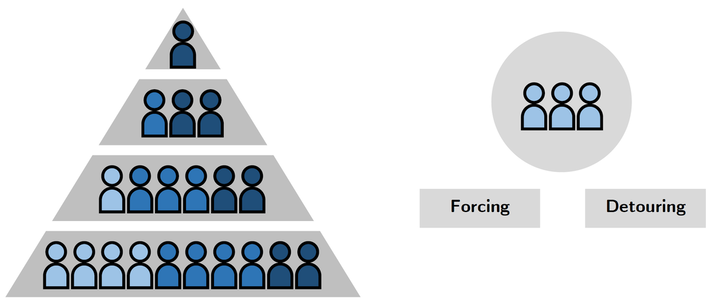Making a Career in Dictatorship:
The Secret Logic Behind Coups and Repression
Who loyally carries out the dictator’s dirty work?
And which individuals actively conspire against the leader?
To explain such extreme behavior, the book investigates the inner workings of the authoritarian security apparatus and the career prospects of individual officers. Our unified theory explains participation in repression (extreme loyalty) and coups (extreme disloyalty) by focusing on organizational promotion systems and the resulting career pressures of those at the losing end. We argue that officers who are disadvantaged in their professional advancement have an incentive to either demonstrate loyalty towards the current leadership by executing repressive orders or commend themselves to a successor leader by participating in a coup (see Figure below). Using original individual-level career data on all 15,000 army officers in Argentina, we analyze biographic differences between individual henchmen, coup plotters, and all other members of the officer corps. We find that officers stuck within the organizational hierarchy and threatened with forced retirement were more likely than their more competitive colleagues to either force their way up in a coup attempt or detour to repressive units in the hope of salvaging their careers. Our findings have implications for understanding unorthodox career trajectories, bureaucratic sabotage, and regime stability.
I undertake the book project together with Christian Gläßel.
The book is part of the "The Anatomy of the Authoritarian Security Apparatus" (AASAP) project, funded by the German Research Foundation (DFG). An integral part of the project is the collection of original, biographical data on security officers in Argentina and Nazi Germany.
And which individuals actively conspire against the leader?
To explain such extreme behavior, the book investigates the inner workings of the authoritarian security apparatus and the career prospects of individual officers. Our unified theory explains participation in repression (extreme loyalty) and coups (extreme disloyalty) by focusing on organizational promotion systems and the resulting career pressures of those at the losing end. We argue that officers who are disadvantaged in their professional advancement have an incentive to either demonstrate loyalty towards the current leadership by executing repressive orders or commend themselves to a successor leader by participating in a coup (see Figure below). Using original individual-level career data on all 15,000 army officers in Argentina, we analyze biographic differences between individual henchmen, coup plotters, and all other members of the officer corps. We find that officers stuck within the organizational hierarchy and threatened with forced retirement were more likely than their more competitive colleagues to either force their way up in a coup attempt or detour to repressive units in the hope of salvaging their careers. Our findings have implications for understanding unorthodox career trajectories, bureaucratic sabotage, and regime stability.
I undertake the book project together with Christian Gläßel.
The book is part of the "The Anatomy of the Authoritarian Security Apparatus" (AASAP) project, funded by the German Research Foundation (DFG). An integral part of the project is the collection of original, biographical data on security officers in Argentina and Nazi Germany.
Figure: Pyramidal organizations and the choices of career-pressured officers.

